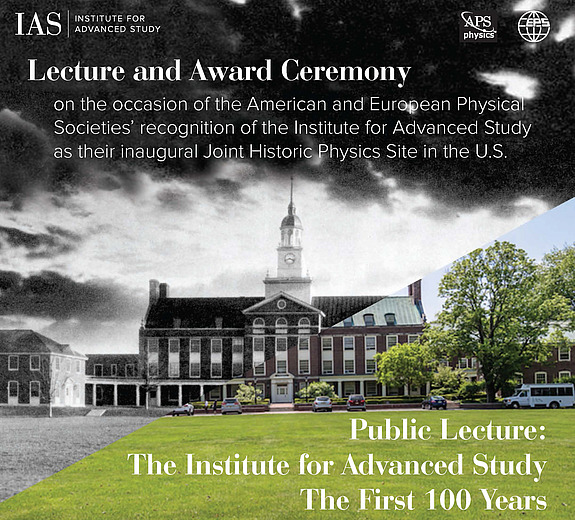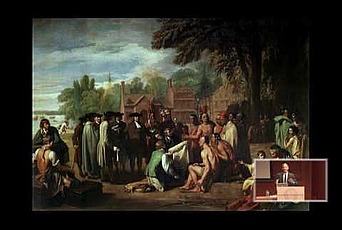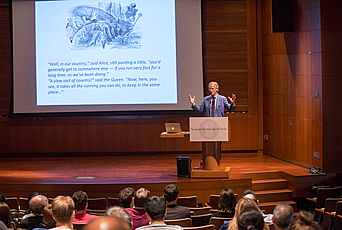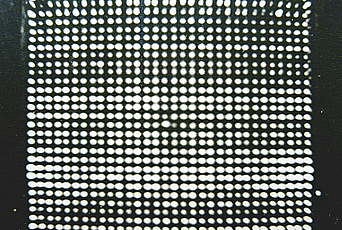Institute Recognized by American and European Physical Societies as Joint Historic Physics Site
Press Contact

The Institute for Advanced Study, one of the world’s foremost centers for curiosity-driven basic research, will be recognized by the American Physical Society (APS) and the European Physical Society (EPS) as their first Joint Historic Physics Site in the United States. The award ceremony will immediately follow The Institute for Advanced Study: The First 100 Years, [a video of the talk is available here] a public lecture that author and historian George Dyson will give at 5:30 p.m. on Wednesday, November 9. Both will take place in Wolfensohn Hall, on the Institute campus.
The APS-EPS award recognizes the Institute’s pivotal contributions to the development of theoretical physics, including the work of Albert Einstein, one of the Institute’s first professors, who remained there from 1933 until his death in 1955. Also among the Institute’s past Faculty are distinguished scientists and scholars spanning a range of disciplines, including Robert Oppenheimer, Clifford Geertz, Kurt Gödel, Erwin Panofsky, Hermann Weyl, Hetty Goldman, Homer A. Thompson and John von Neumann. The APS-EPS Historic Site award puts IAS in the company of the Einsteinhaus, the apartment where Einstein lived in Bern, Switzerland, from 1903 to 1905, and the first European site to receive a joint APS-EPS designation, in September 2015.
“We are very pleased to be partnering with the European Physical Society in the first-ever Joint Historic Site for physics in the United States,” said Homer Neal, President of the American Physical Society. “The Institute for Advanced Study has been one of the premier centers for theoretical physics in the world, hosting physicists in all stages of their careers.”
Christophe Rossel, President of the European Physical Society, added, “The European Physical Society is particularly pleased to be a partner with the American Physical Society in declaring the famous Institute for Advanced Study as a joint APS-EPS Historic Site. This collaboration, as well as the world’s leading researchers hosted by the IAS since 1930, demonstrate that physics is truly international. The APS and the EPS work in their respective regions to promote physics and its societal impact to the general public and policy makers, linking the past to the future for a successful curiosity-driven pursuit of knowledge.”
Robbert Dijkgraaf, Director and Leon Levy Professor of the Institute, said, “We are deeply honored to be recognized by the American and European Physical Societies, and particularly pleased to be acknowledged for the work of Albert Einstein, who exemplifies the Institute’s commitment to curiosity-driven research and academic freedom and their capacity to produce knowledge that results in technological and cultural advances.”
In celebration of this honor from the APS and EPS, George Dyson, a frequent Director’s Visitor at the Institute, will deliver a public lecture on the creation of the Institute and its early years. In March 1916, social theorist Thorstein Veblen, who coined the phrase “conspicuous consumption” in his 1899 Theory of the Leisure Class, completed his Higher Learning in America, published at the close of World War I in 1918. Veblen called for the post-war institution of “academic houses of refuge,” including “a freely endowed central establishment where teachers and students of all nationalities, including Americans with the rest, may pursue their chosen work.” In 1923, Oswald Veblen followed his uncle’s lead by suggesting to Simon Flexner, director of the Rockefeller Institute, that he help “found and endow a Mathematical Institute.” Noting how often “an attempt to solve a physical problem has resulted in the creation of a new branch of mathematics,” Veblen sought to add other sciences to the mix.
Simon Flexner answered that “I wish that sometime you might speak with my brother, Mr. Abraham Flexner,” and Veblen did. Their conversation led, in 1929, to siblings Louis Bamberger and Caroline Bamberger Fuld, who had launched their retail fortune by selling distressed merchandise out of a vacant Newark storefront in 1892. The Bambergers saw the flood of distressed intellectuals fleeing Europe as an opportunity not to be missed. To advance not only the pursuit of knowledge, but, as Abraham Flexner put it, “the cause of social justice which we have deeply at heart,” they opened a department store for the freedom of ideas.
Support for this event is provided by a grant from the Schwab Charitable Fund made possible by the generosity of Eric and Wendy Schmidt.
Admission is free, but registration is encouraged at www.ias.edu/events/george-dyson-lecture2016.
About the Institute for Advanced Study
The Institute for Advanced Study is one of the world’s leading centers for theoretical research and intellectual inquiry. The Institute exists to encourage and support curiosity-driven research in the sciences and humanities—the original, often speculative thinking that produces advances in knowledge that change the way we understand the world. Work at the Institute takes place in four Schools: Historical Studies, Mathematics, Natural Sciences and Social Science. It provides for the mentoring of scholars by a permanent Faculty of approximately 30, and it ensures the freedom to undertake research that will make significant contributions in any of the broad range of fields in the sciences and humanities studied at the Institute.
The Institute, founded in 1930, is a private, independent academic institution located in Princeton, New Jersey. Its more than 6,000 former Members hold positions of intellectual and scientific leadership throughout the academic world. Thirty-three Nobel Laureates and 41 out of 56 Fields Medalists, as well as many winners of the Wolf and MacArthur prizes, have been affiliated with the Institute.
About the American Physical Society
The American Physical Society is a non-profit membership organization working to advance and diffuse the knowledge of physics through its outstanding research journals, scientific meetings, and education, outreach, advocacy, and international activities. APS represents over 53,000 members, including physicists in academia, national laboratories, and industry in the United States and throughout the world. Society offices are located in College Park, MD (Headquarters), Ridge, NY, and Washington, D.C.
About the European Physical Society
The European Physical Society is a not for profit association whose members include 42 National Physical Societies in Europe, individuals from all fields of physics, and European research institutions. As a learned society, the EPS engages in activities that strengthen ties among the physicists in Europe. As a federation of National Physical Societies, the EPS studies issues of concern to all European countries relating to physics research, science policy and education.


